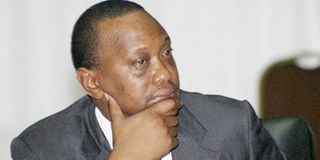Uhuru faces biggest test in his backyard

Deputy Prime Minister Uhuru Kenyatta faces the most challenging times in his political career. Photo/FILE
What you need to know:
Uhuru's nightmare
- Supporters want him on the ballot though other forces are pushing him to back Mudavadi in Jubilee alliance
- Voter apathy in Central if he steps down for Mudavadi
- Integrity questions over The Hague charges and relations with donors
- How to assuage hardliners riding on his candidature to win elective office
- Fear of backlash from non-Kikuyu voters
- How to win over Western province if Mudavadi is not Jubilee candidate
- Balancing competing interests in the Jubilee coalition
Deputy Prime Minister Uhuru Kenyatta faces the most challenging times in his political career, besieged by a confluence of factors over the position he vies for in the next elections.
The National Alliance leader is nestled between unyielding voters and political aspirants in his central Kenya back yard on the one hand and the need to overcome local politics to pave way for any candidate who will clinch the Jubilee Coalition presidential ticket.
On Friday, members of the Jubilee Coalition drawn from TNA, United Democratic Forum and United Republican Party were optimistic that they would name a presidential candidate by next Tuesday.
The leaders spoke as Mr Kenyatta, UDF’s Musalia Mudavadi and William Ruto of URP planned to address their first Jubilee Coalition joint rally.
Only a wedding of Mr Kenyatta’s niece prevented the trio from attending Friday’s meeting in Narok, where Mr Ruto stated that their coalition would win the next elections in the first round.
The joint rally, to be held in Housing Minister Soita Shitanda’s Malava constituency, will unveil the Jubilee Coalition, which will face the Coalition of Reforms and Democracy (CORD) of Prime Minister Raila Odinga and Vice-President Kalonzo Musyoka.
The Malava meeting will be followed by a church service in central Kenya by three leaders.
Recommendations on how the Jubilee Coalition will nominate its presidential candidate have already been handed to the trio by a technical team led by lawyer Fred Ngatia.
Cabinet minister Jamleck Kamau, URP spokesman Aden Duale and UDF secretary general Dan Ameyo confirmed that one of the recommendations proposed was a delegates system.
“Both Uhuru and Musalia have agreed to take part in the nomination process and the rules have been handed over to them,” said Mr Kamau, the Nairobi Metropolitan Minister.
Mr Duale said they expect the three leaders to pick on one of the options by next Tuesday.
Presidential candidate
“The three will decide which method to be used. They were to make that decision by yesterday or today. Let Kenyans be assured that by next Tuesday, Jubilee will have a presidential candidate in place,” said the Dujis MP.
Mr Ameyo said the technical team had concluded its work as instructed.
“We have left it to them to look for time and agree,” he said.
The first option proposes a presidential electoral college of 5,054 delegates. They will consist of six party members per county from UDF and TNA, who will constitute 11 per cent of the delegates.
The rest will be filled with delegates from TNA, URP and UDF based on the number of party members as at December 4, 2012.
Consensus was proposed as the second option, considering the divisive nature of the delegates system, the logistics of hurriedly assembling 5,000 delegates, and the short period within which the alliance has to name its presidential candidate.
It is the headache of the presidential candidacy that is troubling Mr Kenyatta. The TNA leader has built a fanatical base in central Kenya and attracted a group of aspirants whose survival in the next elections hinges on Mr Kenyatta’s candidacy. Then there are the moderate voices who prefer a candidate from outside the community.
There are reports that people around President Kibaki prefer a leader from a different community and that they are touting Mr Mudavadi for the ticket. This is based on grounds that President Kibaki would not like to be succeeded by a leader from his region.
State House has, however, refuted the reports stating that President Kibaki should not be dragged to into coalition making. Political analyst Peter Kagwanja summarises the situation in central Kenya over the choice between Mr Kenyatta and Mr Mudavadi.
“There are people who can nominate and support Mr Mudavadi. Others say whatever the case, they will not because they are driven by the love for Mr Kenyatta. Some of them (political aspirants) are driven by the love for themselves to get the TNA ticket. But things could change after the nominations,” he said.
Prof Kagwanja argued that the International Criminal Court case facing Mr Kenyatta has galvanised support for him while the tribulations of internally displaced persons, majority of them Kikuyus, has hardened the political stand of the Central Kenya voters.
However, he observes that unlike other communities, central Kenya residents would rather vote for their son or daughter.
Ethnic cocoons
“The most worrying thing is that whereas other communities have opened up and are ready to support any candidate, the Kikuyus and Luos are stuck in ethnic cocoons,” he argued.
Central Kenya Parliamentary Group chairman Ephraim Maina and Mr Kamau, however, differ with Prof Kagwanja.
“The people of central Kenya are ready to support a leader who will win, be it Uhuru or Musalia. Those who claim opposite are living in the past,” he said.
He quickly pointed a finger at Jubilee coalition rivals, claiming they had hatched a plot to split the alliance. “I see the hand of enemies of the Jubilee alliance.”
Mr Kamau, the Kigumo MP, said they had rallied voters in the region behind the Jubilee coalition and dismissed fears that voter apathy would hit the area if Mr Kenyatta was not on the ballot paper.




